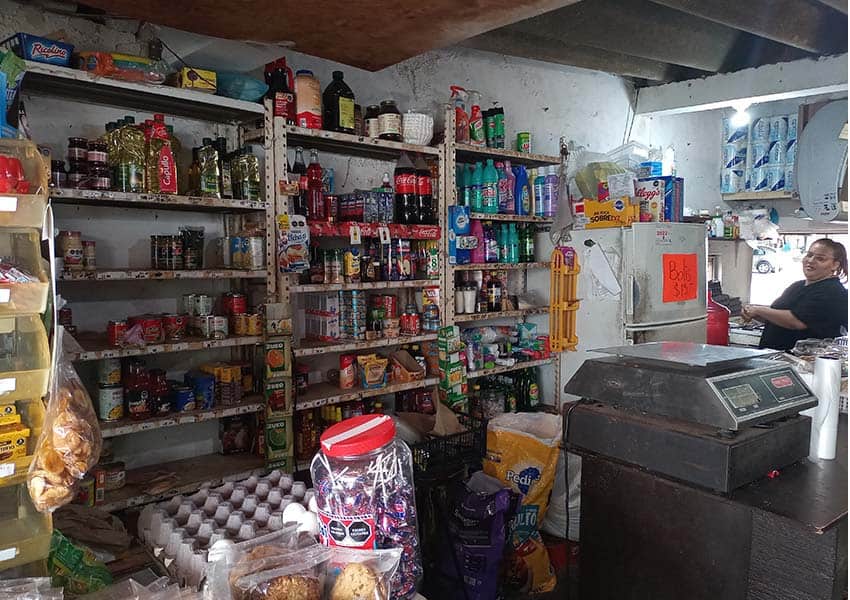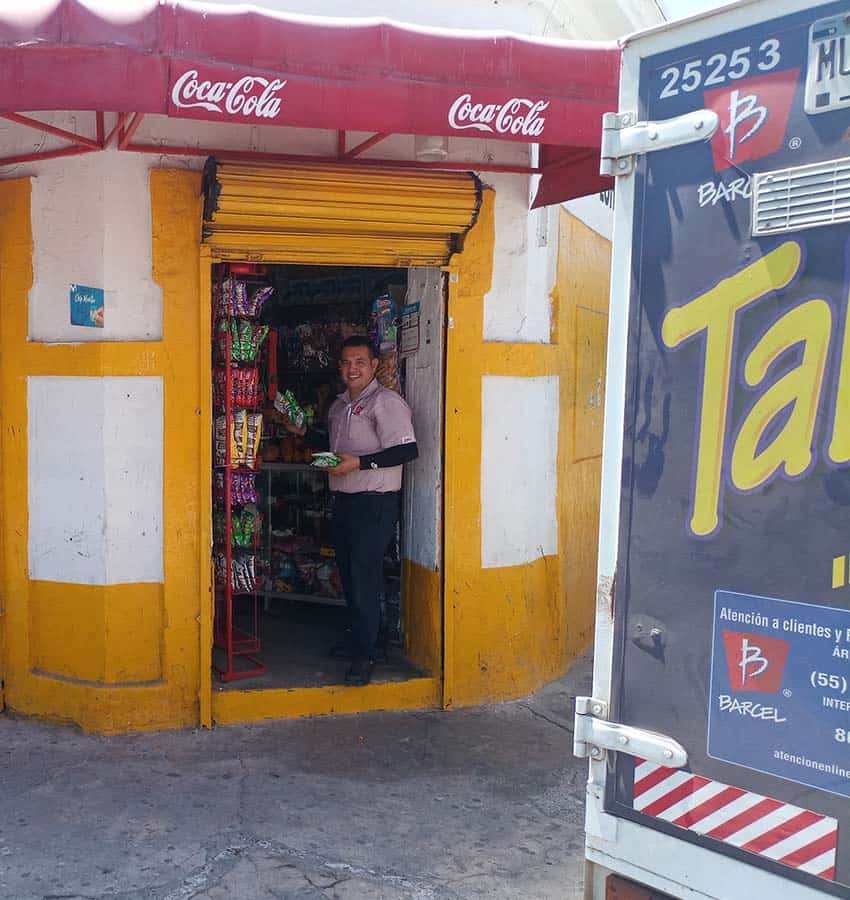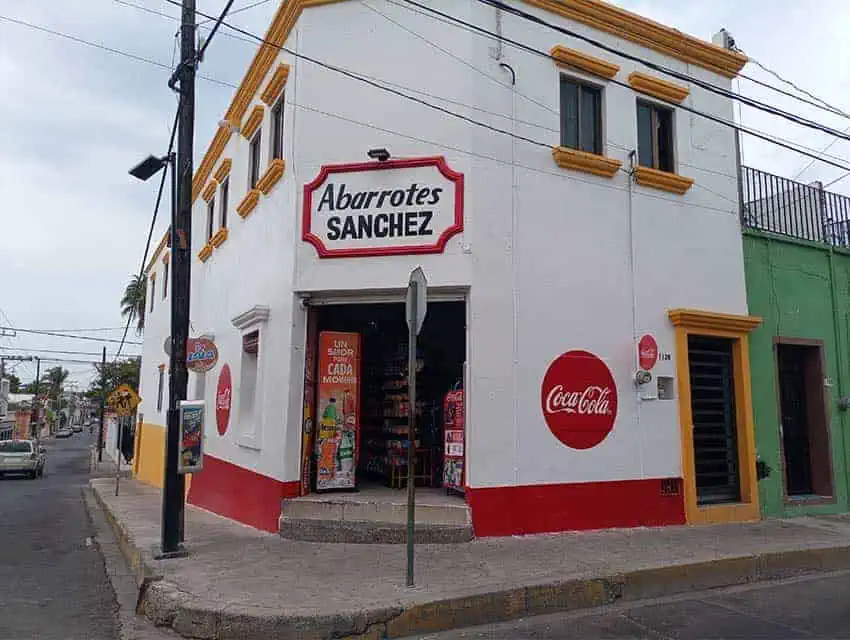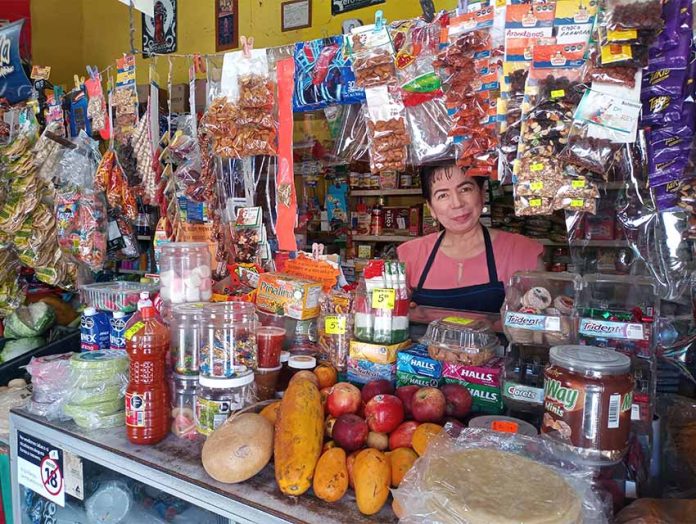Today we introduce, “Field Trip,” a new monthly series by Janet Blaser that explores the everyday adventures of shopping in Mexico.
Need a Band-Aid? Ten pesos worth of Chihuahua cheese? One big black garbage bag for some extra clean-up?
Head to your neighborhood abarrotes store, where you’ll find all of these things — and so much more.

My favorite is Lorena’s, a little tienda (mom-and-pop store) in the neighborhood where I used to live. Even if I don’t see what I’m looking for, chances are it’s back there behind the counter somewhere and Lorena knows exactly where to find it.
Queso fresco, paper towels, a baggie of home-cooked frijoles…you name it, chances are she’s got it.
And, miracle of miracles, and oh-so-convenient (and surprising!): you can buy just one. One ibuprofen or aspirin, one egg, one disposable diaper, or even one cigarette.
You might wonder what the difference is between these abarrotes stores and an OXXO, Kiosko or even a big farmacia (pharmacy). For starters, they’re privately owned, not part of a big national chain like OXXO is, and they’re often connected to the owner’s house.

The people working behind the counter are usually the owners or family members, not employees, so they have a vested interest in your being a satisfied customer who will return again and again. Prices will be competitive or often lower than a bigger chain, or even the mercado (neighborhood open-air market).
They’ll also have more products and more local handmade products than those aforementioned other options. Fresh produce, delivered once or twice a week; pan dulce, tortillas and bolillos fresh every morning; tortas — either made on the spot and grilled (the best!) or, again, brought fresh every day or so from a local person making them at home.
Often small stores like this still source their goods from local producers. At Lorena’s, a dairy farmer delivers twice a week, unloading fresh cheeses and yogurt from big coolers in the back of his beat-up blue pickup. Still-warm, fresh-made corn tortillas from the tortillería a few blocks away arrive each morning too, to be wrapped in cloth towels and stored in a cooler. Where? Behind the counter, of course.
You’ll also find pay de queso, flan and bolis — plastic bags filled with agua fresca and frozen. Yes, you’ll also find the requisite bottles of Coke in every size, bags and bags of chips, commercial dairy products, canned goods and cleaning supplies.
And, when you go to pay, the counters are often overflowing with a mélange of completely unrelated items: a few fragrant, ready-to-eat mangoes, packages of flour tortillas, a couple of small containers of spicy-looking salsa roja, open bags of candy clipped shut so kids can use their pesos to buy just one of their favorites, a stack of conchas inside a big plastic bag. It’s impulse buying at its most basic!

One caveat is that sometimes these stores are, well, not the cleanest. Do the ceiling-high shelves full of canned goods ever get dusted? Is the scale calibrated properly? Hmmm. Look past what you can and just remember to disinfect!
Lorena offers informal credit to regulars, writing the day’s total on a tiny square of neon-colored poster board. This has come in handy when I’ve run in intending to just get a handful of cilantro but then decided I needed/wanted some tortillas, that perfectly ripe papaya on the counter, a new purple broom and — hey, why not? — one of the still-warm tamales de pollo.
She’s run the tiny, two-room store for 36 years and lives with her family in the attached house that extends out the back. She knows all the locals — her neighbors — by name and has watched many of them grow up and start their own families.
And she remembers your eating habits — that you seem to eat a lot of bananas and like to try new things, for example. It was because of Lorena that I discovered Suaves, Mazatlán’s iconic coconut marshmallows that remain an addictive favorite of mine to this day. Her tiendita (little store) is open seven days a week for more than 10 hours a day, and although sometimes her husband or daughter are behind the counter, most often it’s Lorena. She loves what she does, and it shows. When you enter, there’s always a smile on her face and a happy greeting by name.
The Mexican government’s official statistics for 2022 say there are 987,616 tiendas de abarrotes in the country. So it’s safe to say there’s an abarrotes store on almost every street corner in Mexico, in every state, city, town and pueblo, and you owe it to yourself to scout out the ones nearest you, then become a regular.
Janet Blaser is the author of the best-selling book, Why We Left: An Anthology of American Women Expats, featured on CNBC and MarketWatch. She has lived in Mexico since 2006. You can find her on Facebook.
